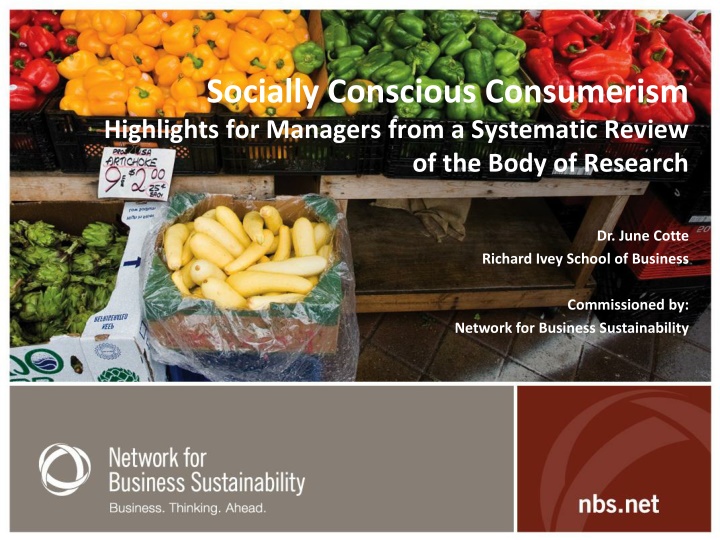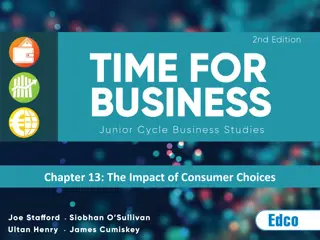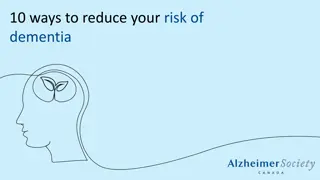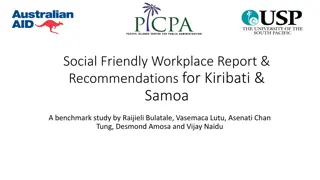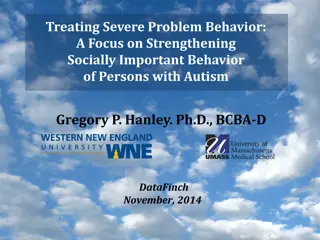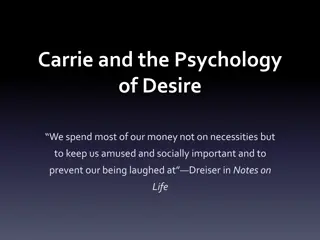Socially Conscious Consumerism
This systematic review by Dr. June Cotte from Richard Ivey School of Business outlines key findings on socially conscious consumerism, offering valuable insights for managerial decision-making. The research, commissioned by the Network for Business Sustainability, provides a comprehensive overview of the literature in this area, shedding light on strategies and implications for businesses aiming to engage with socially conscious consumers.
Download Presentation

Please find below an Image/Link to download the presentation.
The content on the website is provided AS IS for your information and personal use only. It may not be sold, licensed, or shared on other websites without obtaining consent from the author.If you encounter any issues during the download, it is possible that the publisher has removed the file from their server.
You are allowed to download the files provided on this website for personal or commercial use, subject to the condition that they are used lawfully. All files are the property of their respective owners.
The content on the website is provided AS IS for your information and personal use only. It may not be sold, licensed, or shared on other websites without obtaining consent from the author.
E N D
Presentation Transcript
Socially Conscious Consumerism Highlights for Managers from a Systematic Review of the Body of Research Dr. June Cotte Richard Ivey School of Business Commissioned by: Network for Business Sustainability
The NBS bridges the gap between industry and academia Academics produce valid, reliable and objective research Practitioners need relevant and actionable knowledge
Key conclusions from the body of research Do not compromise product functionality Fear punishment, but don t expect a reward Drivers: efficacy, context, etc attributes? No more surveys
Will consumers purchase based on social attributes? http://upload.wikimedia.org/wikipedia/commons/thumb/0/09/M%26Ms_Recycled_Bag.jpg/486px-M%26Ms_Recycled_Bag.jpg http://upload.wikimedia.org/wikipedia/commons/thumb/3/38/Prius_Circuit_Version2.JPG/800px-Prius_Circuit_Version2.JPG http://upload.wikimedia.org/wikipedia/commons/thumb/7/7a/Fairtrade.jpg/563px-Fairtrade.jpg We have many anecdotes and case studies Toyota Prius Fair trade coffee Niche products and statistics on intentions 44% of Germans are LOHAS consumers (Ipsos 2009) 84% of French are willing to pay 10% premium (Globescan 2007) but little evidence on behaviours! Images from Wikimedia Commons contributors (in order): , Ranveig Thattai, George W Chevalier
Environment appears to be a key driver Consumer Acceptance CSR Dimensions: Behavior-Based Studies 0% overall CSR 4% Percentage of studies showing willingness to pay premium 4% consumer ethics 8% 8% animal rights 8% 0% Percentage of studies showing willingness to change behavior other 0% 8% organic 8% 13% sourcing 13% 0% cause-related 0% 13% labor practices 17% 17% environment 38%
Consumers will not trade off product functionality [Some consumers] are willing to pay a premium for social attributes but will not sacrifice product functionality. (Auger et al. 2006; consistent with Bhattacharya and Sen, 2004)
Few studies observe consumers actually paying premiums; the average premium is about 10% Studies Showing Willingness to Pay as Percentage Increase studies measuring actual behaviors studies measuring consumer intentions 8 7 6 5 4 3 2 1 0 5-9% 10-19% More than 20% Note: based on a small set of the total studies that included specific increases (13/91)
There may be a greater discount for unsustainability Willingness to Pay $10 17 % premium $9 $8 $7 29 % discount $6 $5 $4 $3 $2 $1 $- Ethical Control Unethical Source: Trudel and Cotte, 2009, SMR
Influences Gender, Age, Educa-tion SEC, Culture, Nation Involve-mentSocial and Peer Gov t Policy Influence Willingness to Change Behavior Consumer Attitudes towards CSR Actions Consumer Behavioral Intentions Firm CSR Actions Willingness to Pay a Premium Willingness to Punish Impediments: -Negative consumer attributions (why? greenwashing) -Effect on perceived quality -Negative perceptions of consumer efficacy -Consumer sacrifice Enhancements: -Positive perceptions of consumer efficacy -Acceptance of firm and consumer responsibility Impediments: -Competitive actions -Confusion at POP -Habit -Misleading packaging -Required trade-offs Enhancements: -Clear benefit -Prior small commitment -Consistency/fit with brand -Salience of issue -Simplified claims/labels -In-store education Impediments: -Contradictory firm actions -Prior negative consumer knowledge or attitude re: firm Enhancements: - Consumer knowledge of action -Consumer understanding -Prior positive consumer attitude re: firm -Company / issue fit Enhancements and Impediments
Stay informed. Join the Network Search our database of sustainable consumerism research at nbs.net
